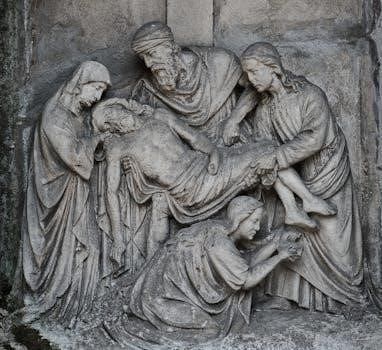Overview of the Twelve Apostles
The twelve apostles were chosen by Jesus Christ from among his disciples․ These men‚ with diverse backgrounds and personalities‚ became the foundational leaders of the early church․ They were not scholars‚ but they were teachable and available‚ ready to follow Jesus․
The twelve apostles were not chosen for their worldly status‚ but rather for their willingness to follow Jesus․ These men‚ who came from various walks of life‚ were transformed by their time with Christ․ Their stories are central to understanding the beginnings of Christianity․ They were ordinary individuals who were called to an extraordinary purpose․ The selection of these twelve‚ with their diverse personalities and backgrounds‚ shows that God chooses those who are available and teachable․ The apostles‚ in their initial roles as disciples‚ were constantly learning from Jesus‚ and they eventually became the ones to lead the church after his ascension․ The group included fishermen‚ a tax collector‚ and others from ordinary trades․ God used their lives and flaws to spread the gospel throughout the world․ They were the recipients of Jesus’ teachings‚ and they became witnesses to his miracles and resurrection․ Their transformation was a testament to the power of Christ․ Their mission‚ though challenging‚ resulted in the establishment of the early Christian community․

The Calling of the Twelve
Jesus called the twelve apostles from his larger group of followers․ This selection was a pivotal moment‚ as these men were chosen for a special mission and purpose to spread his teachings․
Selection and Appointment by Jesus
Jesus’s selection of the twelve apostles was a deliberate act‚ not based on worldly standards of intellect or status․ He chose ordinary men‚ some of whom were fishermen and a tax collector‚ highlighting his focus on character and availability․ The apostles were chosen not for their expertise but for their willingness to follow and be transformed by Jesus․ This appointment was significant as it marked the beginning of their training for leadership․ Jesus called them to be with him‚ to learn from him‚ and ultimately to be sent out as his representatives․ This involved not just hearing his teachings but also witnessing his miracles and experiencing his power‚ preparing them for their future roles in spreading the gospel․ The process of selecting these men underscored that God’s power and plan work through those willing to follow him regardless of their background․

Individual Apostles and Their Characteristics
Each of the twelve apostles possessed unique traits that shaped their interactions with Jesus and their roles in the early church․ These men‚ with their flaws and strengths‚ were chosen․
Simon Peter⁚ Impulsive Leader
Simon Peter‚ also known as Cephas‚ stands out as a prominent figure among the twelve apostles․ He is often recognized as the most well-known and is usually listed first when the apostles are named․ Peter possessed a strong and impulsive temperament‚ which often led him to speak before thinking․ This characteristic resulted in both remarkable moments of faith and instances of regrettable denial․ Despite his flaws‚ Peter’s unwavering belief in Jesus as the Messiah became evident․ He was a fisherman by trade before Jesus called him to become a “fisher of men”․ Peter’s leadership qualities were essential to the early church‚ even if his impulsive nature sometimes caused him to stumble․ His story serves as a testament to God’s ability to use imperfect people․ Peter’s journey reveals how faith can grow․ He was a key figure‚ despite his imperfections․
Andrew⁚ Brother of Peter
Andrew‚ the brother of Simon Peter‚ is another significant apostle among the twelve․ While often overshadowed by his more prominent brother‚ Andrew played a crucial role in the early ministry of Jesus․ He was a fisherman‚ like Peter‚ and was among the first disciples called by Jesus․ Andrew is noted for his role in bringing others to Jesus‚ such as introducing Peter to him‚ leading to Peter’s own discipleship․ He was a man of action‚ always ready to follow Jesus’s call․ While his personality is less highlighted in scripture than Peter’s‚ Andrew’s dedication and quiet service are evident․ He exemplifies the importance of faithfulness‚ even in roles that may not be at the forefront․ His contributions were essential to the ministry of the early church‚ demonstrating that each apostle had a unique and vital part to play․ Andrew serves as an example of discipleship․
James (Son of Zebedee) and John⁚ The Inner Circle
James and John‚ sons of Zebedee‚ held a special place among the twelve apostles as part of Jesus’s inner circle․ These two brothers‚ also fishermen‚ were among the first disciples called by Jesus and shared a close relationship with him․ They were present at many key events‚ including the Transfiguration and the Garden of Gethsemane․ Known for their fiery temperaments‚ they were nicknamed “Sons of Thunder․” James was the first of the twelve to be martyred‚ while John became known as the “disciple whom Jesus loved․” John’s writings‚ including the Gospel of John and the Book of Revelation‚ have significantly shaped Christian theology․ Their inclusion in the inner circle underscores the importance of intimate relationship with Jesus in understanding his teachings and purpose․ James and John‚ despite their imperfections‚ were pivotal in the early church’s development․
Philip and Bartholomew⁚ Less Known Disciples
Philip and Bartholomew‚ while less prominent in the Gospels than some other apostles‚ played their vital roles within the twelve․ Philip‚ known for his practical mindset‚ was the one who brought Nathanael (believed to be Bartholomew) to Jesus․ He also engaged Jesus in a discussion about providing food for the crowd‚ demonstrating his attentiveness to practical matters․ Bartholomew‚ also known as Nathanael‚ was described as a man “in whom there is no deceit․” Although the scriptures offer fewer details about their individual ministries compared to others‚ it is believed that Philip became a missionary in Greece‚ Syria‚ and Phrygia․ He was eventually crucified in Heliopolis․ These two apostles‚ though less detailed in scripture‚ represent the diverse backgrounds and contributions of those who followed Jesus‚ showcasing that every follower‚ known or unknown‚ has an important role in God’s plan․ Their faithfulness is a testament to the gospel’s power․
Thomas⁚ The Doubter
Thomas‚ often remembered as “the doubter‚” is a significant figure among the twelve apostles․ His defining moment came after Jesus’ resurrection when he refused to believe the other disciples’ accounts of seeing the risen Lord․ Thomas declared that he would not believe until he had physically touched the wounds on Jesus’ hands and side․ This initial skepticism‚ though often viewed negatively‚ highlights a human desire for tangible proof․ When Jesus appeared to him‚ Thomas confessed‚ “My Lord and my God!” This transformation shows that doubt can be a pathway to deeper faith․ Thomas’ journey from disbelief to worship reveals the transformative power of encountering the resurrected Christ․ While Thomas may be known for his doubt‚ his eventual faith was as strong as any apostle․
Matthew⁚ The Tax Collector
Matthew‚ also known as Levi‚ stood out among the twelve apostles due to his profession as a tax collector․ In his time‚ tax collectors were often seen as social outcasts and collaborators with the Roman authorities․ This made Matthew’s calling particularly significant‚ as it demonstrated Jesus’ willingness to welcome those whom society rejected․ His background as a tax collector meant that he was likely literate and had experience with record keeping‚ skills that could have been useful in the early church․ Matthew’s transformation from a despised tax collector to a devoted follower of Jesus highlights the power of redemption․ His inclusion in the twelve underscores the radical nature of Jesus’ ministry‚ welcoming all‚ regardless of their past․ Matthew’s later authorship of the Gospel bearing his name solidified his contribution to the New Testament․

The Mission and Purpose
The apostles’ mission was to preach the gospel‚ baptize new believers‚ and establish the church․ They were given authority by Jesus to teach and heal‚ spreading his message․
Apostolic Mission and Authority
The core of the apostolic mission centered around spreading the teachings of Jesus Christ and establishing the foundation of the Christian church․ These twelve individuals were not only disciples‚ but they were also given a specific authority‚ directly bestowed upon them by Jesus; This authority included the power to perform miracles‚ heal the sick‚ and cast out demons‚ demonstrating divine endorsement of their message․ Their primary purpose was to go out to all nations‚ sharing the good news of the gospel and baptizing new followers in the name of the Father‚ Son‚ and Holy Spirit․ They were also tasked with teaching new converts to observe all that Jesus had commanded‚ ensuring the continuation and growth of his teachings․ The apostles were sent as representatives of Christ‚ carrying a message of salvation and establishing local churches throughout the region․ This mission was designed to impact the world‚ transforming hearts and bringing people into a relationship with God․

The Replacement of Judas
Judas Iscariot‚ one of the original twelve‚ betrayed Jesus‚ leading to his death․ This act created a vacancy‚ which was subsequently filled by Matthias‚ chosen to restore the apostolic number․
Matthias Chosen to Replace Judas
Following Judas Iscariot’s betrayal and subsequent death‚ the remaining eleven apostles recognized the need to maintain the divinely ordained number of twelve․ This decision was rooted in their understanding of the significance of the twelve as representing the twelve tribes of Israel‚ a symbolic foundation for the new covenant community․ The selection process involved prayer and the casting of lots‚ a method believed to reveal God’s chosen candidate․ Two men were proposed⁚ Joseph called Barsabas‚ also known as Justus‚ and Matthias․ The lot fell upon Matthias‚ indicating divine approval for his inclusion among the apostles․ This event is documented in the Book of Acts‚ underscoring the importance of maintaining the integrity of the original apostolic band and highlighting the early church’s commitment to seeking divine guidance in crucial decisions․ Matthias‚ now numbered among the twelve‚ continued the mission and ministry entrusted to them by Jesus․
